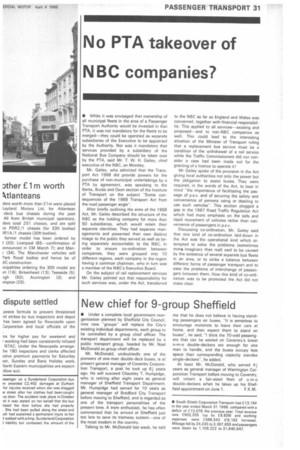N o PTA takeover of N BC companies?
Page 33

If you've noticed an error in this article please click here to report it so we can fix it.
• While it was envisaged that ownership of all municipal fleets in the area of a Passenger Transport Authority would be invested in that PTA, it was not mandatory for the fleets to be merged—they could be operated as separate subsidiaries of the Executive to be appointed by the Authority. Nor was it mandatory that services provided by a subsidiary of the National Bus Company should be taken over by the PTA, said Mr. T. W. H. Gailey, chief executive of the NBC, on Monday.
Mr. Gailey, who admitted that the Transport Act 1968 did provide powers for the purchase of non-municipal undertakings by a PTA by agreement, was speaking to the Barks, Bucks and Oxon section of the Institute of Transport on the subject "Some consequences of the 1968 Transport Act from the road passenger angle".
After briefly outlining the aims of the 1968 Act, Mr. Gailey described the structure of the NBC as the holding company for more than 50 subsidiaries, which would retain their separate identities. They had separate managements and presented their own distinct image to the public they served as well as being separately accountable to the NBC. In order to ensure co-ordination between companies, they were grouped into 10 different regions, each company in the region having a common chairman, who in turn was a member of the NBC's Executive Board.
On the subject of rail replacement services Mr. Gailey pointed out that responsibility for such services was, under the Act, transferred to the NBC as far as England and Wales was concerned, together with financial responsibility. This applied to all services—existing and proposed--and to non-NBC companies as well. This could lead to the interesting situation of the Minister of Transport ruling that a replacement bus service must be a condition of the withdrawal of a rail service while the Traffic Commissioners did not consider a case had been made out for the granting of a licence to operate it!
Mr Gailey spoke of the provision in the Act giving local authorities not only the power but the obligation to assist buses, They were required, in the words of the Act, to bear in mind "the importance of facilitating the passage of p.s.v. and of securing the safety and convenience of persons using or desiring to use such vehicles". This section plugged a gap in the 1967 Road Traffic Regulation Act which had more emphasis on the safe and rapid movement of vehicles rather than convenience of passengers in p.s.v.
Discussing co-ordination, Mr. Gailey said that one kind of co-ordination laid-down in the Act was the operational kind which attempted to solve the problems (sometimes more imaginary than real) said to be caused by the existence of several separate bus fleets in an area, or to strike a balance between different forms of passenger transport and to ease the problems of interchange of passengers between them. How this kind of co-ordination was to be promoted the Act did not make clear.










































































































